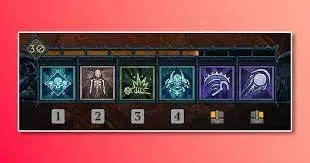
We can't have it all.
Everyone likes to complain about the price of crypto going down, but do they ever complain about the price of crypto going up? That is just the natural order of volatility. What goes up must come down, all good things must come to an end, so on and so forth. Demanding that the world lacks balance is completely unreasonable and potentially delusional.
This concept of balance applies universally.
It can be found everywhere and it is necessary everywhere. The concept of Yin Yang exists for a reason. Fire & Ice. Light & Dark. Good & Bad. True & False. Strong & Weak. Alive & Dead. Rich & Poor. Everything is cyclical. From economies to community to nature itself. Even decentralization is a balance between security & scale, with both sides playing tug-o-war and users in the middle.

What happens when we apply this balance to a video game?
When something gets built like a game the goal is to have it be fun and to have as many people playing it as possible (although I think WEB3 can actually balance this concept of player maximalization). WEB2 strives to get as many users as possible, as that's the foundation of the entire business model across the board. How is this accomplished?
#1: Interoperability.
In order for something to get the most users it has to be available to the most platforms. When I was a kid, Gamestop didn't even exist (well it did it was just called Babbage's) and computer games were separated by PC and MAC, and MAC was garbage (although there were some pretty cool-looking ones like Myst and whatnot). The point isn't which is better however; it's that these too platforms were completely segregated/incompatible and building a product on both at the same time was extremely difficult. Luckily programming languages like Java started addressing this issue and created universal code that could run everywhere.
And vice versa
Used to be if you had a Nintendo you couldn't play Sega games. If you had a PC you couldn't play Mac games. If you had an Atari you were Gen X. Now all of that has changed.
Diablo 4 will release on PC, PlayStation 4, PlayStation 5, Xbox One, and Xbox Series X/S on June 2, 2023. The game will be available for purchase on Blizzard's Battle.net client, as well as through major retailers.
I was shocked to see that Diablo IV was available on not only two different console platforms but also two different generations of the same console platform. Available on PS4 & PS5? Available on XBOX One and XBOX X/S? That is wild. That is true interoperability right there at its finest. Really impressive connectivity on that one.
How is this accomplished?

It's accomplished with several compromises being made in the design and coding of the game. The biggest example of such a compromise is the ability to only use six skills at a time. In D1, D2, and WOW you can use any skill you have, which could be dozens. Of course the ability to use literal dozens of abilities requires a keyboard for bindings (and in the case of WOW almost certainly LUA mods if you're being serious). Meanwhile, there are only so many buttons on a video game controller... so if we want console players in our game with us then that means making these kinds of sacrifices.
Speaking of sacrifices
Another big choice that gets made in RPGs these days is whether or not the world around us scales up with the player level. I believe Skyrim was one of the first prominent games to do this. As you leveled up all the quests and monsters around you would also level up in tandem. There are a ton of advantages and disadvantages to this model, but interoperability is certainly one such advantage. Used to be if you were level 50 and your friend was level 20 then you couldn't really play together in a meaningful way (except trying to powerlevel your friend so that you can start playing for real). Just another example of how the inner workings of the game can also be modified to include interoperability between other people playing on the same system.
Speaking of MODs...
The cost of interoperability is that you don't get to use them. If you play Factorio with someone on a Nintendo Switch they can't use mods. If you play Minecraft on the Bedrock version (compatible with consoles) then you can't play mods. Diablo 4 will also not have mods, because again mods add a particular level of complexity that makes interoperability between everything much more difficult. The complexity and potential bugs/exploits skyrockets. Can't have that.
What about the economy?
Economies can be exploited: especially video game economies because all the scarcity is completely artificial and hardcoded into it. Sybil attacks are always the biggest threat vector. How crazy would it be if you could just go outside right now and turn over a rock only to have 247 gold pieces explode out of it? Ah well that would make gold's value quite meaningless because unlike a video game gold is actually quite difficult to mine and refine. It has real scarcity that is not artificial. Much like Bitcoin, gold's mining scarcity is based on the energy and overhead cost needed to mine it. This is then balanced against the price that society is actually willing to pay for it. Lower price: less gold; higher price: more gold. It's a self-balancing system of supply and demand.
Catering to the masses
Well I personally love interacting with economic systems and trying to figure them out, but most people simply... don't. This is a theme that runs deep across many industries. When things become popular they often end up becoming "candy coated" and "sellout" products in order to appeal to the largest group possible. "I liked it before it was cool," comes to mind here. Also the entire concept of politics applies to this type of corrupting force. When everyone pays the same (one person one vote) the system in question will often take a turn for the worse.
I suppose the same argument could also be made to show that the idea of communism and equality is also quite bad in many regards. When it really comes down to it some people are simply better than others (hugely dependent on specific context). A master guitar player is better than a novice guitar player. A church is (hopefully) better at helping the poor than a greedy corporation.
If our systems of government could actually measure and reflect that fact accurately without being exploited it would make a great foundation for meritocracy. Of course the devil is in the details and no such system has ever existed over the course of mankind. The entire concept of government is in itself a compromise. Utopia is a fantasy (luckily so is the opposite).
Analysis
In order to make good compromises we have to be quite certain about what our goals are in the first place. If we don't know what we want then how on earth are we going to compromise our positions for the good of the whole? The problem with crypto is that it's so new and unknown that even stating the goals in a concrete objective manner is quite difficult.
Sure, we could say we want "decentralization" but that's also a meaningless nothing word that could mean a dozen things to a dozen different people. Literally every project says they're decentralized. It's meaningless buzz-word sentiment at this point. So innovative and disruptive I tell ya.
And then there are all the points I made earlier. Is it even possible for crypto to build a game that doesn't have an economy? I really don't think that it is... so the solutions we create are going to have to be completely different and totally incomparable to WEB2 solutions. Although I do have some ideas on this front that will have to be saved for another time.
Conclusion
We can't have it all, compromises must be made. Luckily, utilizing decentralization and opt-in governance, the decisions that one powerful group makes will have no effect on decisions other powerful groups make. In fact it's quite likely that we'll end of with a full spectrum of options across the board once the movement really kicks into full swing. Choose your own adventure.
Return from Goals & Compromises to edicted's Web3 Blog
